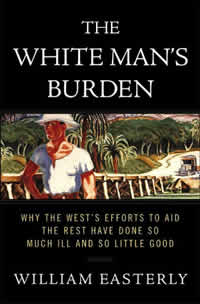Book Notes
 William Easterly, The White Man’s Burden: Why the West’s Efforts to Aid the Rest Have Done So Much Ill and So Little Good (New York: The Penguin Press, 2006), 448pp.
William Easterly, The White Man’s Burden: Why the West’s Efforts to Aid the Rest Have Done So Much Ill and So Little Good (New York: The Penguin Press, 2006), 448pp.
Book review by Julie Schaffner, Visiting Associate Professor of International Economics in the Fletcher School at Tufts University.
The explanation promised in the subtitle of William Easterly’s book is that Western interventions in poor countries—from World Bank development projects to military “peace building” operations—have been driven by "Planners" rather than "Searchers." Planners pursue utopian objectives, design global blueprints, and implement them with little local knowledge and little feedback from the intended beneficiaries. Searchers seek first to understand the specific needs of intended beneficiaries, and then—drawing on detailed local knowledge, as well as trial and error—identify practical ways of meeting those needs. Where Planners dominate, accountability for achieving real benefits is lacking.
Over the course of eleven chapters, Easterly describes the ills wrought by Planner mentality in the wide-ranging fields of official foreign aid, Western efforts to build free markets and democracy in poor countries, conditional lending by the International Monetary Fund, early Western responses to the AIDS crisis, colonialism, decolonization, and contemporary military occupations. He writes with wit, personal connection, and a thought-provoking combination of statistical analysis and anecdotes. His tone conveys his anger over lives devastated by ineptitude and willful ignorance on both the Left and Right.
Easterly digs most deeply and usefully into the causes of Planner ineffectiveness when he examines the case closest to his own experience: official foreign aid. (He confesses to having spent many years as a foreign aid Planner himself while working as an economist for the World Bank.) With many official aid organizations pursuing the same vague goals, each may claim responsibility for apparent successes while blaming others for failures; and their rich constituencies often seem to accept numbers of reports written, summits organized and dollars spent as if they were measures of success. Thus aid organizations feel little outside pressure to demonstrate true beneficial impact in the lives of real people. They are also constrained by norms preventing field staff from staying long in any one region, and by rules requiring them to partner with corrupt country governments. Planners thrive in this environment, while Searchers are continually frustrated.
By documenting the failures of foreign aid, Easterly aims to convince readers that increasing the effectiveness of aid is at least as important as recent high-profile efforts to increase the volume of aid. By identifying Planner mentality as an important source of failures, he begins the task of figuring out how aid effectiveness might be improved. And his discussion offers many useful hints in that direction. But he has much more to say about what breeds failure than about what breeds success. The reader ends up wishing that Easterly had sacrificed some of his digressions into failures of political and military interventions in order to pursue further the practical steps that might be taken to combat Planner mentality and promote increased accountability in the administration of official foreign aid.


